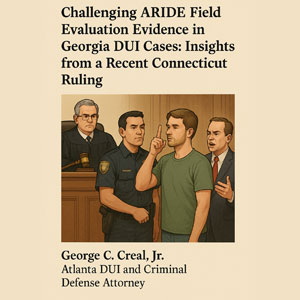Call Now For A Case Evaluation
Call Now For A Case Evaluation
 As a Georgia DUI lawyer with over 30 years of experience fighting for clients’ rights, I’ve seen how field sobriety tests can make or break a case. One tool law enforcement often relies on is the Advanced Roadside Impaired Driving Enforcement (ARIDE) program, developed by the National Highway Traffic Safety Administration (NHTSA) in collaboration with the International Association of Chiefs of Police (IACP). ARIDE trains officers to detect drug impairment using standard alcohol tests like the horizontal gaze nystagmus test, 9 step walk and turn, 30 second one leg stand, lack of convergence test, finger-to-nose test, and modified Romberg test. But is this evidence always reliable in court for drugs? A recent unpublished decision from Connecticut, State v. Langshaw, No. K10K-CR21-0373037-S & K10K-MV21-0745856-S, 2025 WL 2124394 (Conn. Super. Ct. July 23, 2025), highlights why ARIDE results may not hold up under scrutiny—offering persuasive guidance for Georgia cases.
As a Georgia DUI lawyer with over 30 years of experience fighting for clients’ rights, I’ve seen how field sobriety tests can make or break a case. One tool law enforcement often relies on is the Advanced Roadside Impaired Driving Enforcement (ARIDE) program, developed by the National Highway Traffic Safety Administration (NHTSA) in collaboration with the International Association of Chiefs of Police (IACP). ARIDE trains officers to detect drug impairment using standard alcohol tests like the horizontal gaze nystagmus test, 9 step walk and turn, 30 second one leg stand, lack of convergence test, finger-to-nose test, and modified Romberg test. But is this evidence always reliable in court for drugs? A recent unpublished decision from Connecticut, State v. Langshaw, No. K10K-CR21-0373037-S & K10K-MV21-0745856-S, 2025 WL 2124394 (Conn. Super. Ct. July 23, 2025), highlights why ARIDE results may not hold up under scrutiny—offering persuasive guidance for Georgia cases.
ARIDE is designed to bridge the gap between basic Standardized Field Sobriety Tests (SFST) for alcohol and full Drug Recognition Expert (DRE) evaluations. Officers use it to spot signs of drug impairment, such as from central nervous system (CNS) depressants like Klonopin. However, these tests aren’t foolproof. They were adapted from alcohol validated field sobriety tests and medical practices that were modified for roadside use, and their scientific foundation for detecting drug impairment is unproven in field studies so there is no scientific rigor to determine if ARIDE results are reliable in the courtroom or on the roadside.
In Georgia, the admissibility of scientific or technical expert testimony, including field tests like ARIDE, is governed by the Daubert standard. This requires judges to act as “gatekeepers” to ensure evidence is reliable and relevant before it reaches a jury. Factors include whether the method has been tested, peer-reviewed, has known error rates, and is generally accepted in the scientific community. Georgia adopted Daubert for civil cases in 2005 as part of tort reform and extended it to criminal cases in 2022 through House Bill 478, amending O.C.G.A. § 24-7-702. No verified authority found for specific Georgia appellate decisions directly addressing ARIDE admissibility under Daubert. However, the general legal principle is that if the state can’t prove the tests’ scientific validity for drug detection, they may be excluded or limited.
In State v. Langshaw, the defendant was arrested for drug-impaired driving after admitting to Klonopin use and performing poorly on SFST and ARIDE tests. He filed a motion to exclude the results, arguing they weren’t reliable for non-alcohol impairment and would prejudice the jury. The court held a Porter hearing (Connecticut’s version of Daubert) and heard from police officers and an optometrist expert.
The ruling? The court largely sided with the defense on ARIDE:
The court emphasized that ARIDE tests “do not stand on their own” and aren’t validated like full DRE evaluations. It distinguished alcohol cases, where SFST has precedent, from drug cases without toxicology confirmation. While State v. Langshaw is binding only in Connecticut, it’s persuasive authority in Georgia because both states apply similar Daubert/Porter frameworks to exclude unreliable scientific evidence.
This echoes broader concerns: ARIDE relies on subjective interpretations, and studies like the 1984 Johns Hopkins DRE validation (cited in the case) don’t specifically validate ARIDE for all drugs. Without strong scientific backing, these tests can mislead juries about impairment.
In Georgia, DUI cases involving drugs often hinge on field tests when blood or urine results are absent or contested. If you’re facing charges, we can challenge ARIDE evidence by demanding a Daubert hearing. Prosecutors must prove the tests’ reliability—something Langshaw shows isn’t always easy, especially for non-alcohol impairment.
For example:
Georgia courts have emphasized Daubert’s flexibility but insist on excluding “pseudoscientific” evidence. If ARIDE doesn’t pass muster, it could tip the scales in your favor.
At George C. Creal, Jr., P.C., we aggressively challenge flawed evidence in DUI cases. If you’ve been arrested and ARIDE tests were involved, don’t assume they’re ironclad. Contact us today for a free consultation—we’ll review your case and fight to exclude unreliable testimony. Remember, one roadside test shouldn’t define your future.
George C. Creal, Jr. is a trial lawyer focusing on DUI defense in Georgia. This post is for informational purposes and not legal advice.

George Creal is a trial lawyer who has been practicing law
in the Metro-Atlanta area for over 27 years. George brings
a broad range of experience to the courtroom. Read More